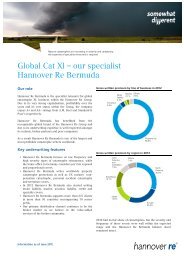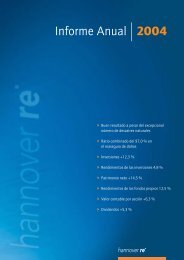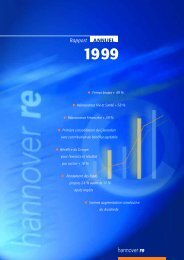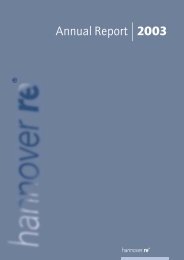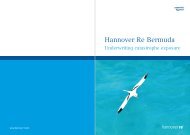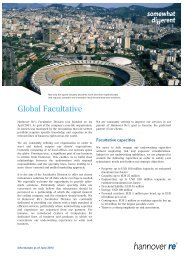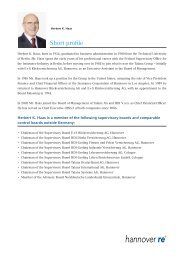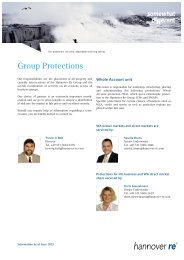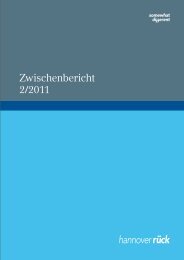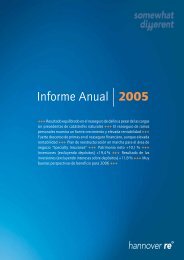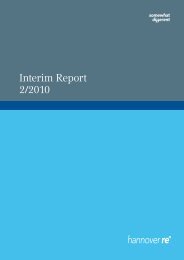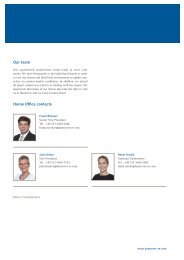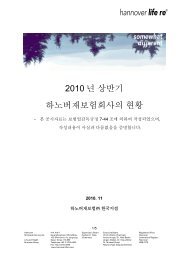Annual Report 2010 - Hannover Re
Annual Report 2010 - Hannover Re
Annual Report 2010 - Hannover Re
You also want an ePaper? Increase the reach of your titles
YUMPU automatically turns print PDFs into web optimized ePapers that Google loves.
come. Currency translation differences from the translation of<br />
non-monetary assets measured at fair value via the statement<br />
of income are recognised with the latter as profit or loss from<br />
fair value measurement changes. Exchange differences from<br />
non-monetary items – such as equity securities – classified<br />
as available for sale are initially recognised outside income<br />
in a separate item of shareholders’ equity and only booked to<br />
income when such non-monetary items are settled.<br />
The individual companies‘ statements of income prepared in<br />
the national currencies are converted into euro at the average<br />
rates of exchange and transferred to the consolidated financial<br />
statement. The conversion of foreign currency items in the<br />
balance sheets of the individual companies and the transfer of<br />
these items to the consolidated financial statement are effected<br />
at the mean rates of exchange on the balance sheet date.<br />
In accordance with IAS 21 “The Effects of Changes in Foreign<br />
Exchange Rates” differences from the currency translation of<br />
financial statements of foreign Group companies must be recognised<br />
in the consolidated financial statement as a separate<br />
item in shareholders‘ equity. Currency translation differences<br />
resulting from long-term loans or lendings without specified<br />
maturity between Group companies are similarly recognised<br />
outside the statement of income as a separate item in shareholders’<br />
equity.<br />
Key exchange rates<br />
1 EUR corresponds to:<br />
31. 12. <strong>2010</strong> 31. 12. 2009 <strong>2010</strong> 2009<br />
Mean rate of exchange<br />
Average rate of exchange<br />
on the balance sheet date<br />
AUD 1.3068 1.6048 1.4510 1.7839<br />
BHD 0.4997 0.5404 0.5009 0.5267<br />
CAD 1.3259 1.5048 1.3758 1.5916<br />
CNY 8.7511 9.7847 8.9895 9.5419<br />
GBP 0.8585 0.9042 0.8592 0.8966<br />
HKD 10.3146 11.1172 10.3232 10.8274<br />
KRW 1,501.6346 1,669.5842 1,541.5994 1,771.3279<br />
MYR 4.0869 4.9113 4.2915 4.9076<br />
SEK 9.0119 10.2986 9.5582 10.6210<br />
USD 1.3254 1.4336 1.3287 1.3969<br />
ZAR 8.7907 10.6121 9.7204 11.6273<br />
Non-current assets held for sale and discontinued operations:<br />
in accordance with IFRS 5 “Non-current Assets Held<br />
for Sale and Discontinued Operations”, non-current assets and<br />
disposal groups are classified as held for sale if the relevant<br />
carrying amount is realised largely through sale rather than<br />
through continued use. Components of an entity that can be<br />
clearly distinguished from the rest of the entity for operational<br />
and accounting purposes and were classified as sold or for<br />
sale are recognised as discontinued operations. Measurement<br />
is at the lower of carrying amount and fair value less costs to<br />
sell. Scheduled depreciation is not taken on non-current assets<br />
classified as held for sale. Impairment losses on fair value<br />
less costs to sell are recognised in profit or loss; a gain for<br />
any subsequent increase in fair value less costs to sell leads<br />
to the realisation of profit up to the amount of the cumulative<br />
impairment. If the impairment loss to be taken on a disposal<br />
group exceeds the carrying amount of the corresponding<br />
non-current assets, the need to establish a provision within<br />
the meaning of IAS 37 “Provisions, Contingent Liabilities and<br />
Contingent Assets” is examined.<br />
Notes<br />
<strong>Hannover</strong> <strong>Re</strong> Group annual report <strong>2010</strong><br />
3.2 SUMMARY of MAjor ACCoUNtiNG policiES Notes<br />
121



